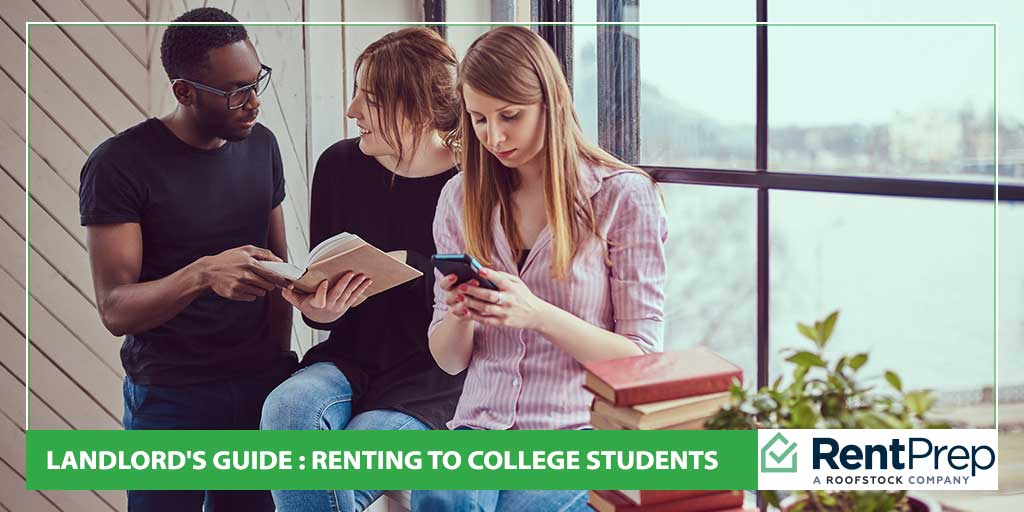
Renting to college students can be highly profitable to landlords who have taken into account all the unique challenges that come with the territory. Of course, owning and operating a rental home full of student tenants can also be a big disadvantage to landlords that aren’t prepared to handle the range of problems that are possible.
A table of contents for renting to college students:
- What are student tenants?
- Pros and Cons of renting to college students
- How to screen college students
- Red flags
- FAQ
What are Student Tenants?

Student tenants are those that are enrolled in a college, university, technical college or some other form of higher education program that operates on a term or semester system. Student tenants generally range in age from 18 to 23, and sometimes even older for those attending graduate schools or specialty programs. Student tenants are primarily single rather than married, and may choose to live with roommates to keep costs down.
Because of their school requirements, their age and their lack of income or credit, student tenants can be a tricky group to rent to. Some landlords refuse to invest in property near colleges so they don’t have to worry about student applicants, while other landlords thrive on filling their investment properties with this booming segment of the rental population.
Pros and Cons of Renting To College Student Tenants
It may seem like a no-brainer to rent to student tenants and just implement the same rules and procedures as a traditional rental.
Here are some of the pros and cons of renting to student tenants:
Pros
- In most college towns, there’s a shortage of off-campus, student-friendly housing, putting such rentals in high and constant demand.
- Stable rental rates help landlords with properties close to campus to set rates that are sometimes higher than the average rent for that city due to higher demand. Also, because the overall off-campus rental market is generally slow to change, the rents have a good chance of staying fairly stable.
- Students generally stay put for the entire school year, giving landlords nine consecutive months of guaranteed income.
- Despite high turnover, landlords generally have plenty of applicants ready to fill any vacancies.
- Minimal advertising is needed to fill vacancies because college students spread information by social media and word of mouth very quickly. Also, landlords can simply advertise exclusively on college-centered mediums.
- The potential for consistent rental payments is high, either from student loans, parents or financial aid. Some students even pay several months in advance or a semester at a time.
- Rental properties don’t necessarily need to be the most modern or the most problem-free to appeal to student tenants who are seeking something affordable versus something high end.
Cons
- Students are generally interested in short-term lease agreements, generally coinciding with an academic year (such as August to May).
- High turnover at the end of each year can lead to lots of extra work for landlords in regards to screening, repairs, and advertising.
- Summer months can be particularly difficult to fill as students leave town to live back home or work at jobs or internships elsewhere.
- The student lifestyle may cause problems at the property, such as partying, noise complaints, and inexperienced tenants that choose not to take care of the property or don’t know how.
- Potential for inconsistent rent payments, due to inexperience in money management or lack of rent money due to unemployment.
- Properties are exposed to more wear and tear than more mature tenants might create.
- Some believe that there is a bubble about to burst with our higher education systems. High tuition costs and rising online alternatives have some living that college housing isn’t a good long-term strategy
The best type of landlord for a student rental is one that is actively involved in the property, lives nearby or has an active property manager that can be close by.
Tenant screening, inspections, and repairs will all be more prevalent with the higher turnover of inexperienced college renters.
When an active landlord puts the effort into student rental properties, they will be well rewarded for their time.
How to screen college students

Like all tenants, there will be some excellent student tenants and some that are less than desirable.
Landlords with property in college towns should make sure they have some very strict processes in place to ensure that they are weeding out student tenants that will be much more costly to deal with. It’s possible to find excellent tenants that are students, making the investment very worthwhile.
There are 5 things that landlords can do to ensure that they are attracting and screening the best of the best when it comes to student tenants.
- Create a custom college student lease agreement. The best leases will be those that that are tailored to student needs and habits. Examples of this include starting and stopping the occupancy dates to coincide with the nearby school schedule and renting by the bed so that one roommate can move out or be evicted without affecting the others’ status.
- Conduct an applicant screening for everyone. From employment history and credit history to criminal history and references, it shouldn’t be done any differently even though they are students. While students may have nothing turn up because of their age and inexperience, it’s always a good idea to do a background check every time.
- Get solid contact information for parents, co-signers or other emergency contacts. It’s a fact that during the college years, students are often still reliant on their parents for financial and emotional support. Having current contact information for parents and co-signers can help ward off trouble in regards to late rent, behavior issues and even abandonment of the property.
- Stay strict on enforcing the lease agreement and community rules. Students have a reputation of being hard on rental properties and disregarding the rules of the lease agreement. Landlords should make sure they enforce the lease conditions such as noise levels, number of people on the lease agreement, charging for damages, and regular inspections.
- Cultivate good habits and break bad ones. If the student tenants are doing a good job at paying rent, keeping the place clean and respecting the rules, consider delivering rewards like gift cards or updated appliances to encourage the good behavior. Similarly, don’t allow students to develop bad renting habits by being lenient on late rent or waiving off lease violations.
Landlords can really benefit from catering to the student tenant market, but only if they have all the tools and preparations in place to ensure the interaction will be as good as it can be. Student tenants are often inexperienced in what it takes to be a good tenant, so landlords need to be extra thorough in how they run their business.
Resources:
- We have tenant screening guides that walks you through every step of the process
- We can also run the background checks for college renters for you
For more information on how to rent to college students, check out this video:
Red Flags and Students
Just as with more typical tenants, there are going to be good ones and bad ones.
Of course, landlords must treat everyone equally and fairly during the application process, but there are often clues to behavior and temperament that can help landlords make the right decisions on who to rent to.
Here is a list of red flags that landlords should watch out for when selecting student tenants based on their applications and interviews:
- Applicants get nervous when told there will be a background check
- They have a long and convoluted story about past problems with credit or a previous landlord
- Student applicants that don’t provide references
- Parents that seem to control every aspect of their student’s life could mean an ill-prepared tenant or a demanding parent that micromanages their living situation
- Applicants are not polite or respectful during the application process
- Student applicants are evasive about how many people will be living in the rental property
- They have a messy car
- Applicants are late to the appointment or miss it altogether
- Students omit or lie about something on their application
Landlords will know that not all of these red flags actually mean that the student tenant should be avoided, but they are warning signs of a potentially deeper problem with the applicant that should be included in an overall assessment.
If there are more than a few of these red flags with any student applicant, landlords should take a closer look to get to the truth.
Conclusion
Remember that rental properties in college towns are considered a great investment by many experts.
Landlords can take advantage of the benefits and avoid many of the risks in providing students with a place to live when they develop a sound strategy.
The specialized approach to student rentals isn’t for everyone, but for those landlords that can supply a clean, quiet, safe and convenient rental property, they should have an endless supply of tenants that are eager to live there.
FAQs
Here are some commonly asked questions about renting to college kids:
Should I have a cosigner for college students?
In this video, we interview an experienced property manager on how he handles situations where the parent is responsible for the student’s rent. If you want to skip ahead to the 4:55 mark you can hear what he has to say.
Every landlord has their own opinions and experiences with renting to college students and dealing with co-signers.
Here’s a screenshot of landlords discussing this question in our private Facebook group for Landlords.

What does insufficient credit mean on a credit report?
This means that the person does not have enough credit history to generate a credit score. This is a common result when running credit of younger renters or college-aged students.
This is why it’s important to have a co-signer for a younger renter who may not have a track record of paying their rent or debts or any credit history to consider.
Renting rooms to college students
We’ve discussed the pros and cons of renting an apartment to college students but not renting a room. If you’re considering renting a room in your house to a college student you’ll want to make sure you’ve been extremely thorough in your screening.
Many people prefer a graduate student in these situations who will be on campus more often. Renting out a room in your house can be advantageous but troublesome. Choose wisely!
Should I charge a higher deposit for student rentals?
A lot of landlords take this approach because it helps mitigate your risk against damages.
If the student is getting help through loans or a co-signer it shouldn’t be a problem for them to come up with funds. Just check your state laws on any security deposit limits.

